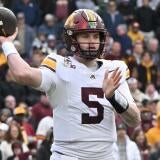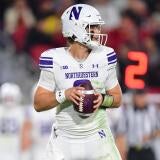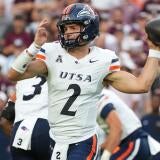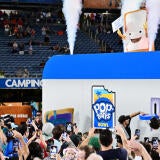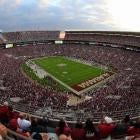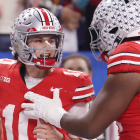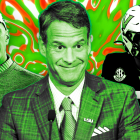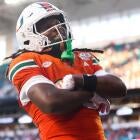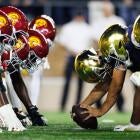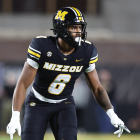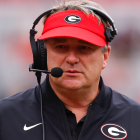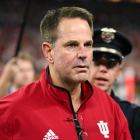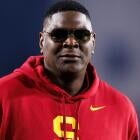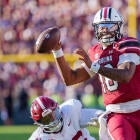Inside College Football: Internet giants could kick start next round of realignment
Conferences have been out to the West Coast to speak with Google, Amazon, Facebook and others
When we look back, the next round of conference realignment may have started now -- right under our noses. What have amounted to pilgrimages to the West Coast by high-powered conference administrators visiting the corporate offices of Google, Amazon and Facebook have become the norm.
It has long been speculated that those internet giants will at least have a hand in the next round of conference alignment by bidding on media rights. It's early -- way early -- but at least preliminary discussions have begun on possible business relationships.
"Everyone in college sports has made a trip to the West Coast to talk to them and others," one TV industry source said.
Amazon is located in Seattle. Facebook calls Menlo Park, California, its home. Google operates 20 minutes down the road in Mountain View.
"I'm not going to get into who I've talked [to, but] you'd have trouble naming one I haven't talked to," said Big 12 commissioner Bob Bowlsby, one of the most aggressive college power brokers on the topic.
The internet giants already are making exploratory moves into televising professional and collegiate sports. For example, the NFL's 10-game Thursday night package begins this week on Amazon Prime. Amazon paid the NFL $50 million, five times what Twitter paid last season.
The Mountain West has six games available this season on Facebook. The money is minimal ("less than six figures," said one conference official) and the exposure may be less, but it's a worthwhile down payment on a glimpse into the future.
"It's like buying a car, and this gives us an opportunity to drive the car for a couple of years whether we want to buy it or not," Mountain West commissioner Craig Thompson said.
The conference's current media deal with CBS and ESPN expires on July 1, 2020. A source said another FBS conference commissioner has ventured west trying to gauge interest in an internet media bidder to perhaps leverage against an ESPN bid.
All the sources contacted for this story stressed linear cable and broadcast TV will remain the dominant delivery system as those internet companies do not run their own for game broadcasts.
Netflix CEO Reed Hastings said this summer he's not interested in live sports for his streaming service.
But there continues to be speculation how conferences will react to market forces in the next eight years. Will it be worth it to college football to reorganize again and maximize its value?
That's what caused that last great upheaval from 2010-14 when there was a net membership change of 11 schools among FBS conferences. (That doesn't include the reconstituted Big East that evolved into the American Athletic Conference in football.)
With a recent contract extension, Bowlsby is almost guaranteed to witness the entirety of whatever changes are coming. His extension takes him to 2025, the last year of the current Big 12 football contract.
You probably don't have to be told the Big 12 is speculated to be the most vulnerable in the next round of realignment.
"I think the board [of directors] would like me to be involved in the negotiations" with media partners, Bowlsby said. "We're all tracking on what the next wave of technology is going to do. I think the world will change significantly between now and then. It's changing at an astonishing rate."
In the midst of Big 12 expansion talks, Bowlsby last year laid out part of his vision for the future.
For any of the internet giants to get involved, they'd have to commit billions to infrastructure and change viewing habits.
For the viewer, what difference does it make if he/she is watching a Yahoo- or ESPN-branded game on their tablet? For the consumer, the tablet is the thing, not who is broadcasting the game.
And someone has to decide to compete financially with the cable/TV giants for the rights.
One industry source envisioned himself on the board of one of these internet giants. They've been making billions in annual profits. How or how much -- the source speculated -- are live sports going to add to the bottom line?
That remains an open-ended question. The Mountain West's Facebook streams have averaged between 500,000 and 1.5 million views, Thompson said.
"A view is less than two seconds," Thompson pointed out. "You might watch a catch."
In the UC Davis-San Diego State game earlier this month, modern technology met with a common frustration. The internet went down for viewers in the first quarter.
"The real key for us is this gives us an experience to hear from fans, hear from coaches, hear from constituents," Thompson said. "If it [works], it [still] has to be monetized."
Why Scott Frost shouldn't leave for Nebraska -- yet
When Central Florida finished off Maryland on Saturday, the drums beat louder (at least on Twitter) for the former Nebraska quarterback to become the next Huskers coach.
Mike Riley is thought to have a short leash after his athletic director Shawn Eichorst was fired three weeks into the season.
Consequently, Frost -- a former national championship quarterback for the Huskers -- is thought to be a logical successor. But he shouldn't take the leap immediately despite UCF's first win over a Power Five in almost four years.
Think about this: Frost first has to establish himself as a coach. You know, win a championship or two. If he goes to Nebraska now and fails, he's probably not getting another Power Five job. If he wins a championship at UCF, he at least has a winning resume to fall back on. Frost is two games into his second season as a head coach. No one knows if he can coach at UCF in the AAC much less at Nebraska in the Big Ten. Or at all.
The lure of an alma mater sometimes is too strong. And many think if Nebraska calls, Frost has to go. But look at recent history. Of the last three coaches at Nebraska (prior to Riley), only Frank Solich is still a head coach (Ohio). That's because he won more than 75 percent of his games at the time of his departure. Among those wins is Nebraska's last conference championship in 1999.
Fifteen games into his head-coaching career, Frost is 8-7.
What if Baylor never happened?
No matter what your politics, the roll back of Department of Education sexual assault guidelines last week begs one obvious question: Would the Baylor scandal have even happened if the new standards were in place?
The Department of Education under secretary Betsy DeVos basically undid reforms enacted during the Obama administration in 2011. It is now easier for the accused to escape prosecution under Title IX laws. The education department said the previous guidelines unfairly persecuted the innocent.
Critics say women will be even more reluctant to come forward. Could the Baylor scandal happen today to the extent it did? Several women sued the school and made Title IX complaints. Two players were jailed. Probably not, said activist Brenda Tracy.
"Art Briles would still be there and women would still be getting assaulted under Betsy," Tracy said. "She just told schools the can go back to operating the way they were [before 2011]. And we know how that went."
Three for the Heisman
With one-third of the season completed, it seemed like a good time to assess the Heisman race.
- Saquon Barkley, RB, Penn State: Barkley's hot start reminds me of Lamar Jackson last September. He has been so spectacular in the season's opening month, it's hard to see how Barkley doesn't win it.
- Luke Falk, QB, Washington State: Starting to go down has one of Mike Leach's best ever quarterbacks. Since the beginning of 2016, no one has thrown for more yards (5,846). He is leading FBS in accuracy (77 percent) and second in touchdown passes (14).
- Josh Rosen, QB, UCLA: Think where the Bruins would be without him. Perhaps winless. Rosen doesn't have much of an offensive line, running backs or a defense. The fortunes of his team and Jim Mora Jr.'s job security ride on his arm. Through four games Rosen leads the nation in passing yards (1,763) and touchdown passes (16).
Transfer issue
An NCAA working group is grinding through the complicated transfer issue, which might not be resolved until 2019. At issue is whether athletes in football, basketball and hockey are unfairly treated by having to sit out a transfer year. (In all other sports, athletes are allowed to transfer immediately.)
A recent report was a bit misleading in saying the NCAA is considering "all" Division I transfers to be eligible immediately. I'm hearing it's just as likely athletes in minor sports will now be sitting out a transfer year as there is football, basketball and hockey players able to transfer immediately. What's more likely to happen is an academic bar set so high for transfers (think minimum GPA), the transfer year waiver will affect only a few athletes.
For graduate transfers, schools may be required to make a two-year scholarship commitment for graduate school to slow the free-agent aspect of the rule. Any school taking a grad transfer then would be bound financially to that scholarship even if the athlete left after one season. A wasted scholarship will make administrators think twice about going to the free-agent market.


